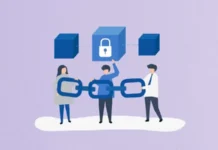Why bother with cybersecurity in your company if you are not responsible? Because even if you don’t work in IT, IT security is still part of your job. You can be held liable if the company has any such problems due to your negligence.
Below, we offer some tips you can carry out in your workplace.
Don’t Write Passwords
A strong and different password for each site and account on the network can be difficult to remember and manage. However, sharing passwords or writing them on a sticky note for anyone to see is an easy way to compromise your company or your own personal data.
Try a password manager that generates strong passwords and remembers them for you. There are many options available.
Use Wi-Fi correctly
You have probably done work outside your office where you had to be connected to the internet. Today, Wi-Fi is a must: gas stations, coffee shops, and airports offer free Wi-Fi. But with free comes drawbacks, and users of free Wi-Fi networks need to take extra precautions to avoid some problems.
If you have no choice but to use a free Wi-Fi network, ensure the network you’re connecting to is secure, use your company’s VPN, and avoid sensitive work or financial transactions.
On the other hand, your company’s Wi-Fi network can also be a target. Larger companies with IT departments should have some experience with secure Wi-Fi implementation, but here are some tips for smaller companies:
Secure your network with a strong password
- Grant access only to people who need to be linked to the network.
- Set up a guest network if you have a lot of visitors and limit their access.
- Don’t use random USB drives.
What would you do if you found a USB stick in your company car park?
Unfortunately, research has shown that most would plug it into their computer, which is bad news for businesses. A weird USB drive is attractive because you never know what it might contain. But it could contain malware that could cause some damage to the corporate network or to your computer.
Avoid phishing
One of the tricks criminals use to break into corporate networks is impersonating a legitimate email sender. No company, large or small, is immune to phishing; It has happened to some of the biggest and best companies.
In the case of a small business, you may think that you are not a target, but your data and access to your client’s files are a big problem. Criminals salivate the idea of stealing personally identifiable data in your customer records. They sell and trade them on what is known as the dark web of the internet. So how can you avoid phishing? Think about these three things before you click.
- Is the link secure? Always check each link before clicking. Hover over it to preview the URL and carefully look for any misspellings or other irregularities. If you’re unsure, open a new browser tab and manually enter the main URL of the site manually.
- Does the message include an attachment? Even if a message looks legitimate, treat links and attachments with suspicion: a colleague might have been hacked.
- Does the message seem reasonable and legitimate? Be careful even with internal messages from your own office. It is relatively easy to make a fake letter that looks like a real letter to, for example, authorize a payment. Look for syntax or other irregularities that should alert you.
Important data backup
Ransomware continues to act through the internet. When a criminal blocks access to data or the entire computer, victims panic and pay a ransom to unlock their files. Companies are not immune to this. Quite the contrary: they are the desired target because they are willing to pay significantly more than the average person to get their files back.
The best thing here is that you can immunize against ransomware by doing something every business should do: backup your data. If you do not have regular backups and are affected by ransomware, you will be at the mercy of cybercriminals. But if you have backups, you can restore your data and continue your work.














